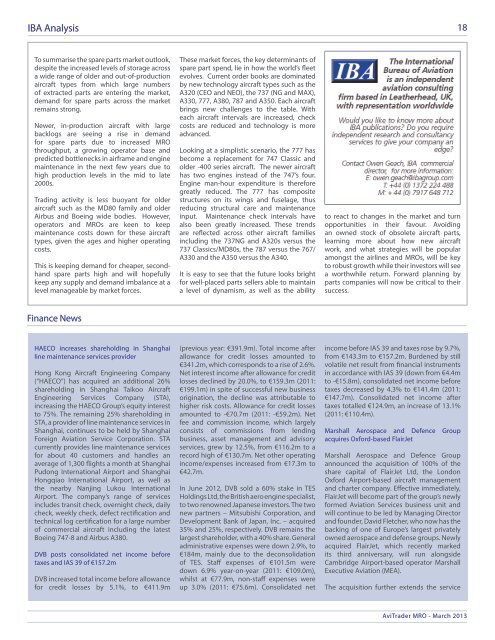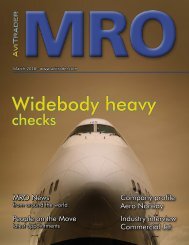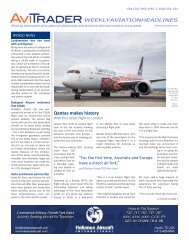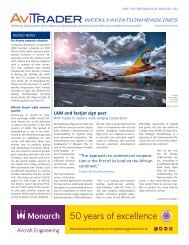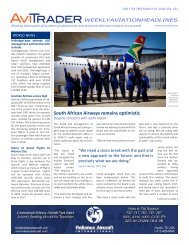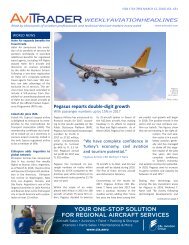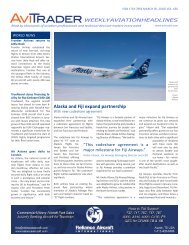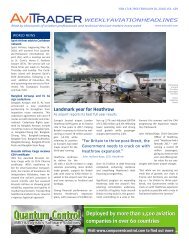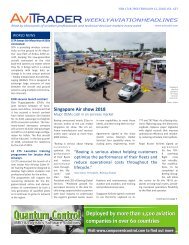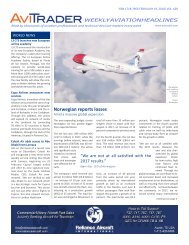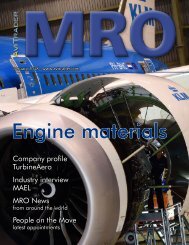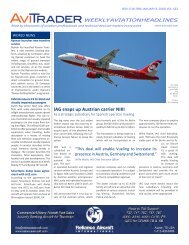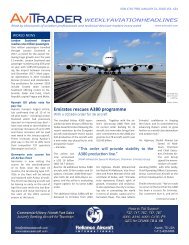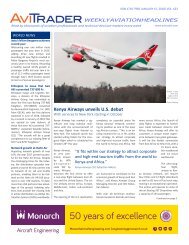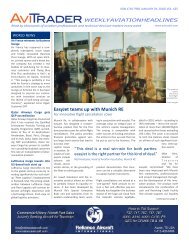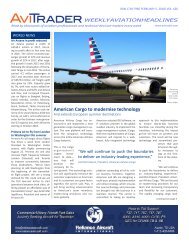AviTrader_Monthly_MRO_e-magazine_2013-03
AviTrader_Monthly_MRO_e-magazine_2013-03
AviTrader_Monthly_MRO_e-magazine_2013-03
You also want an ePaper? Increase the reach of your titles
YUMPU automatically turns print PDFs into web optimized ePapers that Google loves.
IBA Analysis 18<br />
To summarise the spare parts market outlook,<br />
despite the increased levels of storage across<br />
a wide range of older and out-of-production<br />
aircraft types from which large numbers<br />
of extracted parts are entering the market,<br />
demand for spare parts across the market<br />
remains strong.<br />
Newer, in-production aircraft with large<br />
backlogs are seeing a rise in demand<br />
for spare parts due to increased <strong>MRO</strong><br />
throughput, a growing operator base and<br />
predicted bottlenecks in airframe and engine<br />
maintenance in the next few years due to<br />
high production levels in the mid to late<br />
2000s.<br />
Trading activity is less buoyant for older<br />
aircraft such as the MD80 family and older<br />
Airbus and Boeing wide bodies. However,<br />
operators and <strong>MRO</strong>s are keen to keep<br />
maintenance costs down for these aircraft<br />
types, given the ages and higher operating<br />
costs.<br />
This is keeping demand for cheaper, secondhand<br />
spare parts high and will hopefully<br />
keep any supply and demand imbalance at a<br />
level manageable by market forces.<br />
These market forces, the key determinants of<br />
spare part spend, lie in how the world’s fleet<br />
evolves. Current order books are dominated<br />
by new technology aircraft types such as the<br />
A320 (CEO and NEO), the 737 (NG and MAX),<br />
A330, 777, A380, 787 and A350. Each aircraft<br />
brings new challenges to the table. With<br />
each aircraft intervals are increased, check<br />
costs are reduced and technology is more<br />
advanced.<br />
Looking at a simplistic scenario, the 777 has<br />
become a replacement for 747 Classic and<br />
older -400 series aircraft. The newer aircraft<br />
has two engines instead of the 747’s four.<br />
Engine man-hour expenditure is therefore<br />
greatly reduced. The 777 has composite<br />
structures on its wings and fuselage, thus<br />
reducing structural care and maintenance<br />
input. Maintenance check intervals have<br />
also been greatly increased. These trends<br />
are reflected across other aircraft families<br />
including the 737NG and A320s versus the<br />
737 Classics/MD80s, the 787 versus the 767/<br />
A330 and the A350 versus the A340.<br />
It is easy to see that the future looks bright<br />
for well-placed parts sellers able to maintain<br />
a level of dynamism, as well as the ability<br />
to react to changes in the market and turn<br />
opportunities in their favour. Avoiding<br />
an owned stock of obsolete aircraft parts,<br />
learning more about how new aircraft<br />
work, and what strategies will be popular<br />
amongst the airlines and <strong>MRO</strong>s, will be key<br />
to robust growth while their investors will see<br />
a worthwhile return. Forward planning by<br />
parts companies will now be critical to their<br />
success.<br />
Finance News<br />
HAECO increases shareholding in Shanghai<br />
line maintenance services provider<br />
Hong Kong Aircraft Engineering Company<br />
(“HAECO”) has acquired an additional 26%<br />
shareholding in Shanghai Taikoo Aircraft<br />
Engineering Services Company (STA),<br />
increasing the HAECO Group’s equity interest<br />
to 75%. The remaining 25% shareholding in<br />
STA, a provider of line maintenance services in<br />
Shanghai, continues to be held by Shanghai<br />
Foreign Aviation Service Corporation. STA<br />
currently provides line maintenance services<br />
for about 40 customers and handles an<br />
average of 1,300 flights a month at Shanghai<br />
Pudong International Airport and Shanghai<br />
Hongqiao International Airport, as well as<br />
the nearby Nanjing Lukou International<br />
Airport. The company’s range of services<br />
includes transit check, overnight check, daily<br />
check, weekly check, defect rectification and<br />
technical log certification for a large number<br />
of commercial aircraft including the latest<br />
Boeing 747-8 and Airbus A380.<br />
DVB posts consolidated net income before<br />
taxes and IAS 39 of €157.2m<br />
DVB increased total income before allowance<br />
for credit losses by 5.1%, to €411.9m<br />
(previous year: €391.9m). Total income after<br />
allowance for credit losses amounted to<br />
€341.2m, which corresponds to a rise of 2.6%.<br />
Net interest income after allowance for credit<br />
losses declined by 20.0%, to €159.3m (2011:<br />
€199.1m) in spite of successful new business<br />
origination, the decline was attributable to<br />
higher risk costs. Allowance for credit losses<br />
amounted to -€70.7m (2011: -€59.2m). Net<br />
fee and commission income, which largely<br />
consists of commissions from lending<br />
business, asset management and advisory<br />
services, grew by 12.5%, from €116.2m to a<br />
record high of €130.7m. Net other operating<br />
income/expenses increased from €17.3m to<br />
€42.7m.<br />
In June 2012, DVB sold a 60% stake in TES<br />
Holdings Ltd, the British aero engine specialist,<br />
to two renowned Japanese investors. The two<br />
new partners – Mitsubishi Corporation, and<br />
Development Bank of Japan, Inc. – acquired<br />
35% and 25%, respectively. DVB remains the<br />
largest shareholder, with a 40% share. General<br />
administrative expenses were down 2.9%, to<br />
€184m, mainly due to the deconsolidation<br />
of TES. Staff expenses of €101.5m were<br />
down 6.9% year-on-year (2011: €109.0m),<br />
whilst at €77.9m, non-staff expenses were<br />
up 3.0% (2011: €75.6m). Consolidated net<br />
income before IAS 39 and taxes rose by 9.7%,<br />
from €143.3m to €157.2m. Burdened by still<br />
volatile net result from financial instruments<br />
in accordance with IAS 39 (down from €4.4m<br />
to -€15.8m), consolidated net income before<br />
taxes decreased by 4.3% to €141.4m (2011:<br />
€147.7m). Consolidated net income after<br />
taxes totalled €124.9m, an increase of 13.1%<br />
(2011: €110.4m).<br />
Marshall Aerospace and Defence Group<br />
acquires Oxford-based FlairJet<br />
Marshall Aerospace and Defence Group<br />
announced the acquisition of 100% of the<br />
share capital of FlairJet Ltd, the London<br />
Oxford Airport-based aircraft management<br />
and charter company. Effective immediately,<br />
FlairJet will become part of the group’s newly<br />
formed Aviation Services business unit and<br />
will continue to be led by Managing Director<br />
and founder, David Fletcher, who now has the<br />
backing of one of Europe’s largest privately<br />
owned aerospace and defense groups. Newly<br />
acquired FlairJet, which recently marked<br />
its third anniversary, will run alongside<br />
Cambridge Airport-based operator Marshall<br />
Executive Aviation (MEA).<br />
The acquisition further extends the service<br />
<strong>AviTrader</strong> <strong>MRO</strong> - March <strong>2013</strong>


